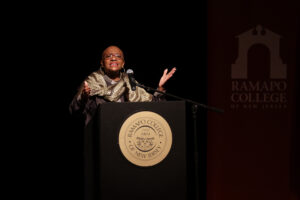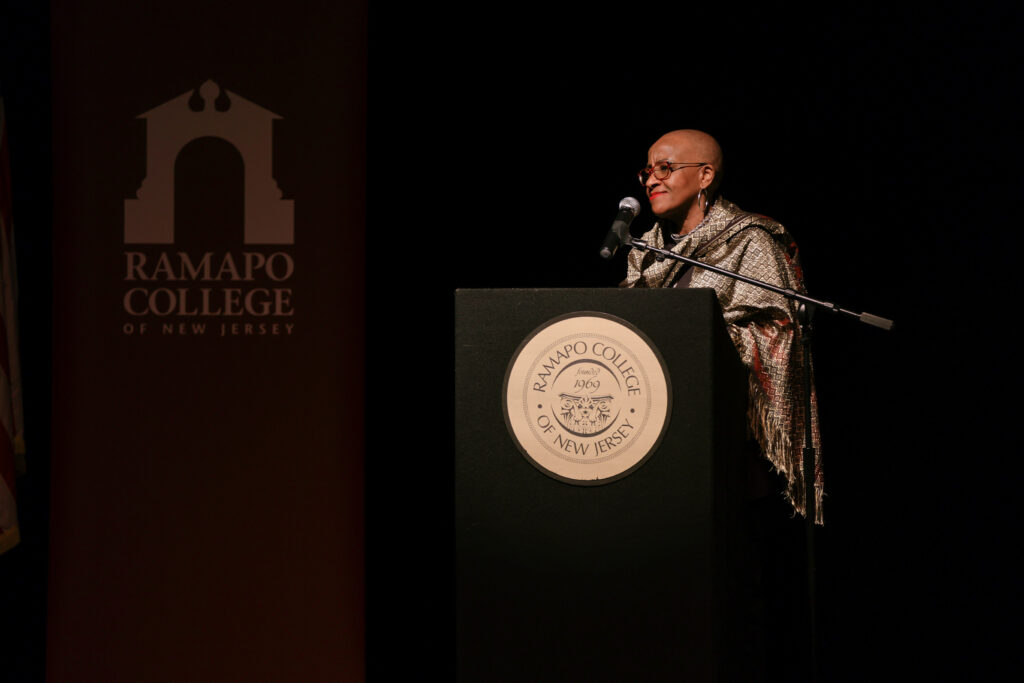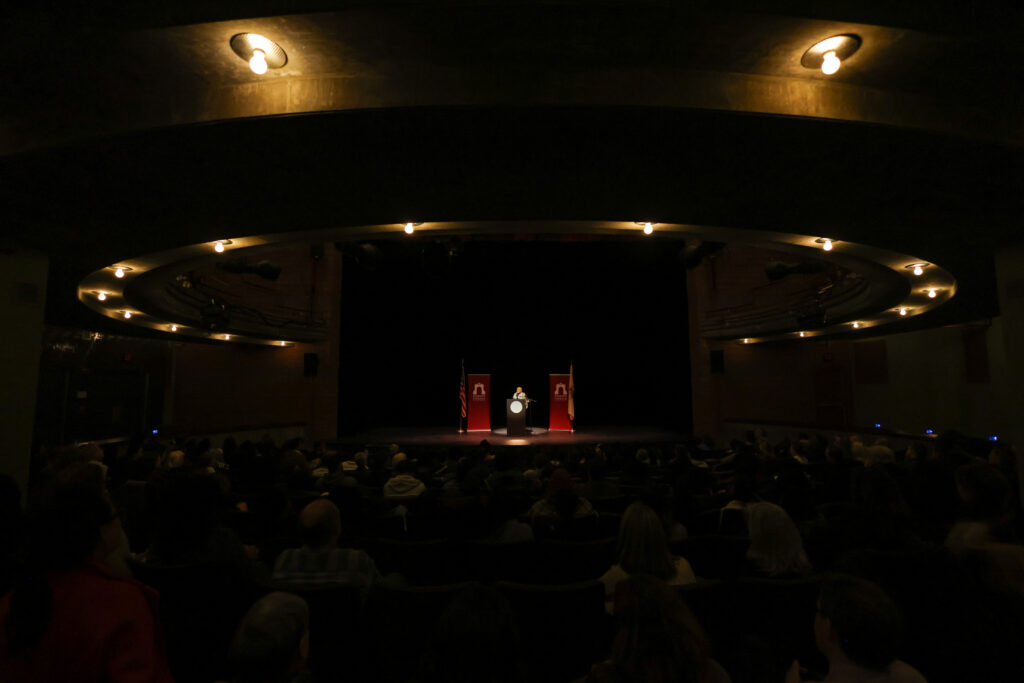- About Ramapo
- Academics
- Admissions & Aid
- Student Life
- Athletics
- Alumni
- Arts & Community
- Quick Links
- Apply
- Visit
- Give
To Be Human: Reverend Tutu speaks at Diversity Convocation

March 5, 2025
by Liz Mendicino ’26
What does it mean to be human? Through blending African proverbs, anecdotes of a childhood in Apartheid South Africa, and well-timed wit, Rev. Nontombi Naomi Tutu answered this question at the 2025 Annual Diversity Convocation.
Rev. Tutu opened by discussing her childhood as a literal-minded, mischievous, African girl. Growing up with a Nobel Peace Prize winning father and a mother equally dedicated to peace and helping others, she was encouraged to be good through many proverbs and warnings. Her parents’ favorite proverb was umuntu ngumuntu ngabantu, meaning ‘a person is a person through other people’. “It speaks to being a whole human being that you cannot be a whole human being in isolation, that it is only in our relationship with one another that we become fully human,” said Rev. Tutu. She reflected that so many times she remembered her parents, whether in response to celebration or chagrin, was simply ‘umuntu ngumuntu ngabantu’. Her eyes lit up while describing the meaning behind the phrase, telling her audience that beyond a parent’s reminder to be good, it was also a compliment of the highest praise, saying “Wow, that is a human being.”
Growing up in Apartheid South Africa was not easy, and Rev. Tutu was quick to admit the ways in which society attempted to make her feel like she did not have a place. Nevertheless, her community lifted her up. She bridged into discussing Nelson Mandela, not as he is remembered as the first democratically elected president of South Africa, but as a prisoner. The stark contrast of how he was painted to the guards and who he was– the man who, from prison, raised the funds to send his guard’s son to college. “And the truth is, in a way they were even more oppressed than we were,” said Rev. Tutu. “We were struggling to end our oppression and they were fighting to maintain theirs.”
 The room audibly took a breath at this; a beat of silence washed over the Sharp Theater. Tutu continued, discussing how fear kept her oppressors under lock and key. “They passed more and more laws trying to stop dissent. They had states of emergency that lasted longer and longer. They had released the military in our communities. They arrested, they tortured, they killed more and more people, and yet they stayed afraid.” She discussed this paradoxical relationship between the oppressor and self-oppression, and the importance of remaining good in the face of adversity. She told the story of a young bishop, who in the face of torture knew that his oppressors could not be fully human without acknowledging his humanity, and that he must remind them of this. Umuntu ngumuntu ngabantu.
The room audibly took a breath at this; a beat of silence washed over the Sharp Theater. Tutu continued, discussing how fear kept her oppressors under lock and key. “They passed more and more laws trying to stop dissent. They had states of emergency that lasted longer and longer. They had released the military in our communities. They arrested, they tortured, they killed more and more people, and yet they stayed afraid.” She discussed this paradoxical relationship between the oppressor and self-oppression, and the importance of remaining good in the face of adversity. She told the story of a young bishop, who in the face of torture knew that his oppressors could not be fully human without acknowledging his humanity, and that he must remind them of this. Umuntu ngumuntu ngabantu.
Rev. Tutu opened the program with her parents’ favorite proverb, and closed by sharing hers: “In the time of floods, the wise build bridges, the foolish build walls.” She emphasized that community is essential in times of crisis, that without bringing diverse perspectives to the table, so much potential would be lost. “We are part of a world whose very existence is predicated on diversity,” she shared. “If we didn’t have different animals, different plants, different seasons, different times, we would not survive! We could not survive if there were only one type of plant. We could not survive if there was only one type of meat. We could not survive if we all had the same gift, we need our diverse gifts for our world to prosper, for our world even to survive.”
A standing ovation from the audience commenced with these words. The perspective that she was able to provide as a global peace advocate could not have been more perfect for this year’s convocation. As she waved goodbye to a packed theater, full of students, faculty, and staff, it was clear the audience was thinking, “Wow, that is a human being.”
 When asked about her visit to Ramapo College, Rev. Tutu shared, “I have been very warmly welcomed. You have a beautiful campus, and the students, faculty, and staff that I’ve interacted with have been just so encouraging. They felt like what I have said is something that is key to this community and that is their experience of this community. I’m really happy to have been able to spend a little time here.”
When asked about her visit to Ramapo College, Rev. Tutu shared, “I have been very warmly welcomed. You have a beautiful campus, and the students, faculty, and staff that I’ve interacted with have been just so encouraging. They felt like what I have said is something that is key to this community and that is their experience of this community. I’m really happy to have been able to spend a little time here.”
The Diversity Convocation is planned every year by the Office of Equity, Diversity, Inclusion and Compliance (EDIC), and has featured a multitude of brilliant speakers in the past. This year in particular, however, was especially poignant. “Goal 2 of the College’s Strategic Plan is to “Foster a diverse, empathetic, and vibrant community that inspires a culture of inclusivity, accountability, and collaboration”, said Nicole Morgan Agard, chief equity & diversity officer. “Rev. Tutu has established a consulting company whose mission is to bring different groups together to learn from and celebrate their differences and to acknowledge their shared humanity. Her experience as a human rights advocate, along with the mission of her consulting company supports Goal 2 by helping to advance a culture of belonging, equity, inclusion, and trust by embracing diversity, access, and accountability, and it aligns with EDIC’s mission of advancing a shared understanding and practice of equity, diversity, inclusion, and justice.”
Through interpersonal and intercultural learning experiences such as Rev. Tutu’s keynote speech, EDIC effectively helps to enrich interdisciplinary education at Ramapo College. Interdisciplinary learning opportunities not only help to shape ethical change agents across all majors at the college, but help to empower students to become the best person that they can be.
After all, a person is a person through other people.
Copyright ©2025 Ramapo College Of New Jersey. Statements And Policies. Contact Webmaster.

Follow Ramapo